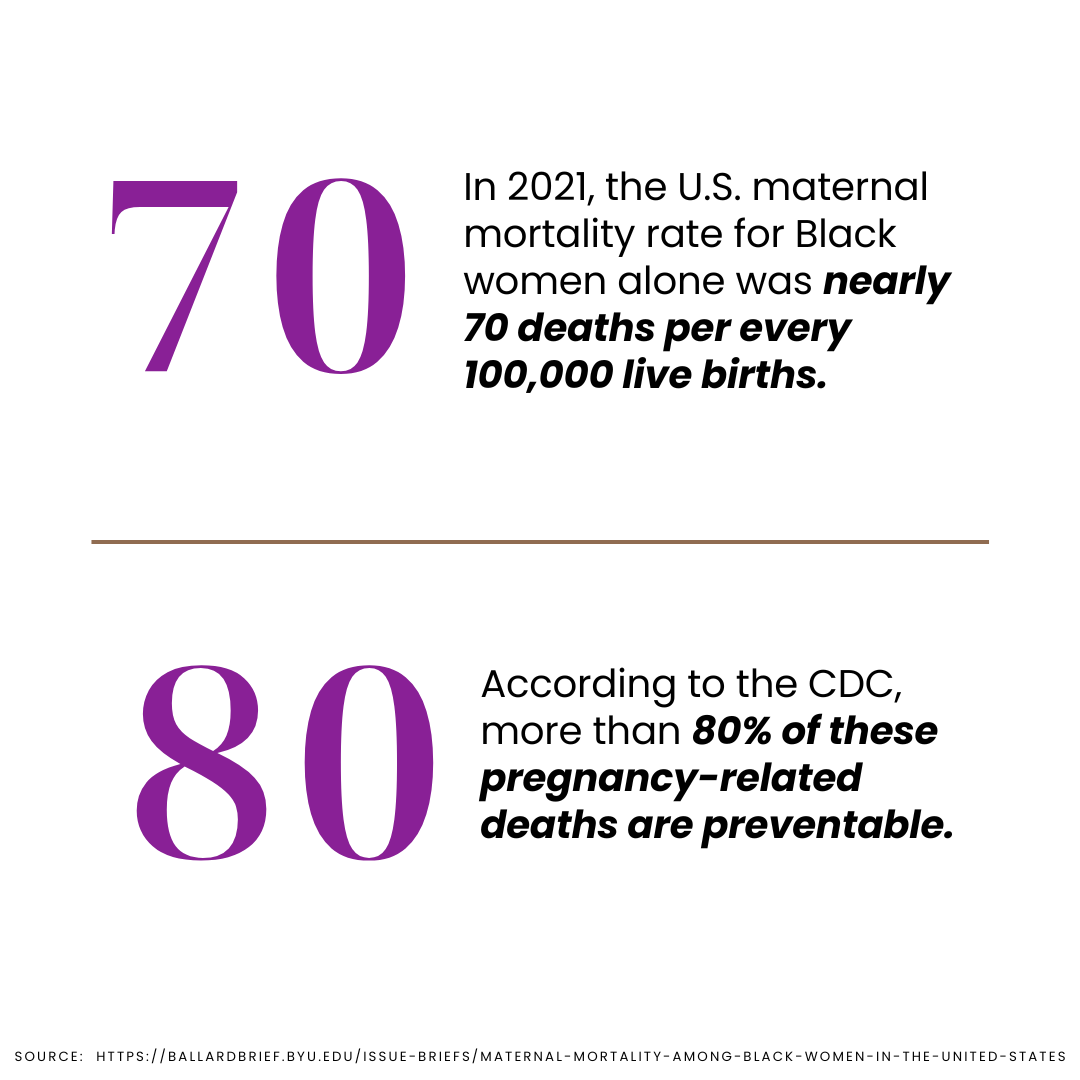Why Are So Many Black Women Dying In Childbirth?

Why Are So Many Black Women Dying In Child Birth
Here’s What You Should Know by Nana Nyantakyi

The United States Has A Problem
Maternal Mortality Rate by State 2021. Map of the United States with outline of states. Legend states “Death per 100,000 live births.” The darkest shade of purple represent >60 - Louisiana are that shade of purple. Next shade of purple represents >50 - Georgia and Indiana are that shade. Next shade is >40 - Texas and Alabama are that shade. Next shade is >30 - Arizona, Arkansas, Missouri, Tennessee, South Carolina, and New Jersey are that shade. Next shade is >20 - Utah, Idaho, Montana, Wyoming, North Dakota, South Dakota, Nebraska, Kansas, Oklahoma, Mississippi, Florida, North Carolina, Virginia, Kentucky, Michigan, Ohio, Pennsylvania and New York are that shade. Next shade is >10 - Alaska, Hawaii, California, Nevada, Oregon, Washington, New Mexico, Colorado, Minnesota, Iowa, Illinois, Wisconsin, West Virginia, Delaware, Connecticut, Rhode Island, Massachusetts, and Maine are that shade. Last shade is white and it is <10 - Vermont and New Hampshire are white.

70 In 2021, the U.S. maternal mortality rate for Black women alone was nearly 70 deaths per every 100,000 live births.
80 According to the CDC, more than 80% of these pregnancy-related deaths are preventable.

Did You Know?
Black women in the United States are three to four times more likely to die from pregnancy-related complications than their white counterparts.
Every mother deserves a safe and healthy pregnancy, yet Black maternal mortality rates are disproportionately high, and not enough is being done about it.
Black women need reproductive justice now, and they can’t wait any longer!

Black Maternal Mortality is a Reproductive Justice Issue
Black maternal mortality is a reproductive health issue that transcends socioeconomic boundaries. Addressing this issue requires a comprehensive approach that tackles institutional bias, improves access to quality prenatal care, and enforces equitable health outcomes for all women. Not to mention, it is imperative that medical professionals start listening to Black women when they speak out about their concerns.

A Dark History of Medical Racism
Medical Experimentation: From Dr. Sim’s experimentation on enslaved women to the Tuskegee syphilis experiments, to the illegal use of Henrietta Lack’s cells for biomedical research, Black people have suffered years of experimentation at the hands of slave owners, scientists, and physicians.
Dangerous Stereotypes: Dating back to slavery, many believe that there are biological differences between Black and White people, such that Black people have higher pain tolerance and thicker skin. These misconceptions only lead to bias in pain assessment and treatment.
Implicit Bias: For years, racial prejudice has influences healthcare in America. Implicit bias continues to affect the quality of healthcare received by marginalized communities. This has ultimately contributed to disparities in diagnosis, treatment, and access to quality care.

Black Women Are Turning To Community Midwives And Doulas
Doulas provide physical and emotional support during pregnancy, childbirth, and the postpartum period. Doula-assisted mothers were two times less likely to experience a birth complication involving themselves or their baby.
Midwives are trained healthcare providers who support a mother emotionally through labor. They prepare tools and supplies for the delivery, administer medicine, and monitor the mother and child before and after birth.

Hope During Hopeless Times
In November 2023, the Federal Way Birth Center opened, marking the first Black-owned birth center in the state of Washington. Licensed midwife Faisa Farole made this historic move acknowledging that “it’s also sad there haven’t been any other in the past, considering Black and Brown women’s status in this maternal health crisis.”
Farole hopes the birth center can flourish into a “hub where community organizations can provide childbirth and lactation education, where aspiring midwives can train, and where families can find wraparound support before, during, and after pregnancy.”

What You Can Do To Help
1. We can all shine a light on this critical issue of Black maternal mortality in America!
2. Join the movement for #MaternalJustice - because every mother deserves a safe and healthy motherhood journey!
3. Amplify voices speaking out about this issue and advocate for change!
4. Urge your local representative to join the fight against Black maternal mortality!
#BlackMaternalHealth #EndDisparities #EquityInHealthcare
